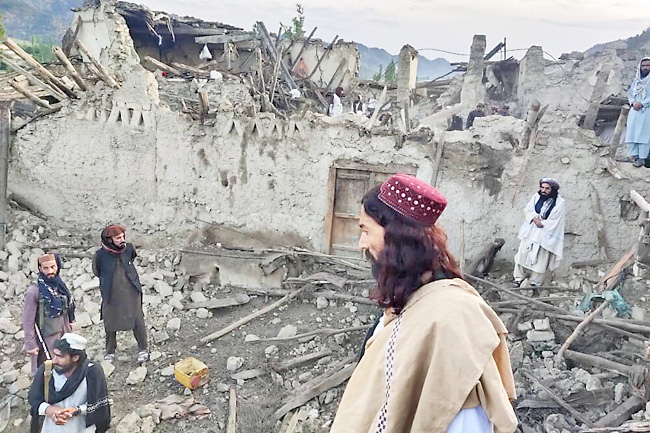KABUL, AFGHANISTAN (AP) – A powerful earthquake struck a rural, mountainous region of eastern Afghanistan yesterday, killing 1,000 people and injuring 1,500 more, according to a state-run news agency. Officials warned that the already grim toll would likely rise.
Information remained scarce on the magnitude 6.1 temblor near the Pakistani border, but quakes of that strength can cause severe damage in an area where buildings are poorly constructed and landslides are common.
The disaster posed a test for the Taleban-led government, which seized power last year as the United States (US) pulled out from the country, two decades after toppling the same insurgents in the wake of the 9/11 attacks.
Rescuers rushed to the area by helicopter yesterday, but the response is likely to be complicated since many international aid agencies left Afghanistan after the Taleban takeover.
Neighbouring Pakistan’s Meteorological Department said the quake’s epicentre was in Afghanistan’s Paktika province, some 50 kilometres southwest of the city of Khost. Buildings were also damaged in Khost province, and tremors were felt as far away as the Pakistani capital of Islamabad.

Footage from Paktika showed men carrying people in blankets to waiting helicopters.
Others were treated on the ground. One resident could be seen receiving IV fluids while sitting in a plastic chair outside the rubble of his home and still more were sprawled on gurneys.
Some images showed residents picking through clay bricks and other rubble from destroyed stone houses, some of whose roofs or walls had caved in.
The death toll given by the Bakhtar news agency was equal to that of a quake in 2002 in northern Afghanistan that struck immediately after the US-led invasion overthrew the Taleban government.
Those are the deadliest since 1998, when a 6.1 magnitude earthquake and subsequent tremors in Afghanistan’s remote northeast killed at least 4,500 people.
In most places in the world, an earthquake of this magnitude wouldn’t inflict such extensive devastation, said seismologist with the US Geological Survey Robert Sanders. But a quake’s death toll more often comes down to geography, building quality and population density.
“Because of the mountainous area, there are rockslides and landslides that we won’t know about until later reporting. Older buildings are likely to crumble and fail,” he said. “Due to how condensed the area is in that part of the world, we’ve seen in the past similar earthquakes deal significant damage.”






